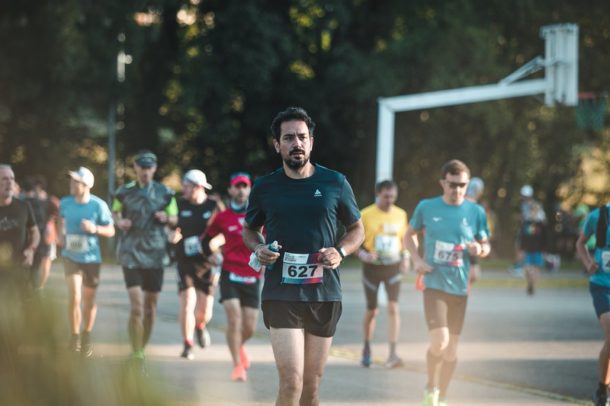
A marathon is a demanding race for the body! This is true for a marathon, but also for a long trail or road race. You’ve just crossed the finish line and you’re already thinking about your post-marathon recovery. First of all, congratulations on what you have accomplished, whether or not you achieved your goal.
Your training should have prepared you for the type of effort you just made. Nevertheless, the stress generated by the event leads to fatigue, and it is important to take good care of your recovery. Here are our tips for post-marathon or long effort recovery.
Contents
Physical Pain
At the finish line of a marathon, it is common for muscles to be sore, and even joints or tendons. Your digestive system (liver, kidneys, intestines) may have been disturbed. Sometimes the euphoria of the finish erases all pain, which appears the next day. In any case, pain or not, it is important to take the time to recover well after a marathon or long effort.
Pain is sometimes more intense on D+1 or D+2. Who has never had trouble going down the stairs the day after a marathon? 😉
It is then easy to understand that the muscles are tired and have not fully recovered.
Underlying Fatigue
Physical pain is just the tip of the iceberg. A marathon runner often has no more physical pain by D+3 or D+4. It would be wrong to think that one is ready to mentally and physically tackle the preparation for the next main goal.
Indeed, marathon training or training for another distance has generated fatigue in the body. Even if training lightens in the last weeks to be fresh on race day, the body may have accumulated general fatigue. Not to mention possible deficiencies, such as in vitamins.
The more intensity you put on race day, the longer the regeneration time needed.
Recovering Immediately After Your Race
You just crossed the finish line in 3h30 or even in 5h? You very likely have a water deficit. Even if you drank your 50cl of water per hour of effort, runners generally finish with slight dehydration. It is important to think about drinking well: mineral water, possibly sparkling, an herbal tea, or a post-exercise drink.
Just after the effort, the body assimilates proteins and carbohydrates better. This is called the metabolic window. You can have nuts, ham, dried fruits, bananas, or other foods at the finish line. You can also have almond milk or a recovery drink.
Don’t necessarily eat a large quantity, especially since your digestive system may have been somewhat damaged. The body mainly sends blood to the active muscles during the effort to the detriment of the digestive system, which weakens it.
Cover yourself as quickly as possible after your race to avoid catching a cold.
Within the hour following the race, try to walk a bit, for 5 minutes, or even jog for those who are not too exhausted. But above all, do not do intense stretching: your muscles have already been heavily solicited. You can do some light joint mobility or very light stretching for about ten seconds.

Recovering the Rest of the Day
If your race was in the morning or ended in the early afternoon, it is recommended to rest quietly or take a nap to optimize the recovery process. Keep drinking regularly, at least 1 liter throughout the rest of the day.
You can put on recovery compression socks, which help eliminate toxins by promoting venous return. You can also massage yourself or get a massage.
Post-race recovery is also mental. If you want to drink a beer or a pleasure drink, you can, even if contrary to legends, beer is not perfect for recovery, mainly because of the alcohol.
For the rest of the day, prioritize eating proteins and carbohydrates.
Recovery in the Days After a Marathon
In terms of diet, eat balanced and, if possible, antioxidant and alkalizing foods. Fruits and vegetables in abundance! Indeed, a long effort on a marathon or trail generates oxidative stress. In the following days, it is preferable not to eat too much meat or acidifying foods.
Sleep is also a determining factor in post-marathon recovery. The night after an effort is sometimes complicated, with the excitement generated by the race, sometimes muscle soreness, or a higher heart rate than usual. The following nights are essential for good recovery, with 8 to 9 hours of sleep.
You can continue to massage yourself, as well as do a cryotherapy session or alternate hot and cold water in the shower to promote regeneration processes. To relax, you can also do heart coherence exercises.
In terms of training, listen to your sensations. Sometimes you feel the need to take a break for several days or to do light activity. For example, you can do some cycling or yoga.
If you do a bit of activity, it’s just to keep your legs moving. Be careful, there is sometimes a bit of euphoria in the days following. This can be a trap with a backlash coming 3-4 weeks after the race if you resume too quickly.
Training According to Your Next Goals
If you don’t have upcoming goals, you can take a break for 6-10 days. Resume when you really want to. That’s a sign your body has recovered!
Don’t wait too long if possible, no more than 15 days after your race. After 15 days, detraining is rapid and resuming becomes difficult. You can start with other sports if you don’t want to resume running immediately.
If you have pain, wait for it to disappear before resuming. Do not hesitate to see a physiotherapist or osteopath in the two weeks after your race.
If your next major goal is close or less than 3 months after your race, you can shorten the recovery time and if possible, with a supported sport. In the 3 days after a marathon, we recommend not exceeding 30 minutes of jogging.
Your jog will be done only at a fundamental endurance pace. You can start extending after 3 days, up to 50 minutes of jogging, possibly with a few sprints afterward. Training can resume normally 7 days later, paying close attention to your sensations.
Sometimes you may feel tired more quickly during interval sessions or have more difficulty sustaining an effort. This means you have not yet fully recovered, so you need to ease up and shorten the last repetitions of the session.
Planning Your Next Race
During post-marathon recovery, it is also an opportunity to review your preparation. Analyze what you did well and what you can improve for next time.
Sometimes marathoners chain five or even ten marathons in a year. But often, some marathons are run to accompany friends and not all are run at 100% capacity on race day. The recovery from a marathon or an ultra-trail while staying easy during the effort will therefore be necessarily faster.
If you give your all to the maximum of your day’s abilities, it creates physical and mental fatigue, and you need to allow yourself 2 to 3 months before another marathon or long trail. Not taking this time leads to injury, regardless of the runner’s level and experience.
We already wish you an excellent recovery! Let yourself be guided by your desires and your RunMotion Coach app, which takes these recovery phases into account after your races. Happy training for your next goals!